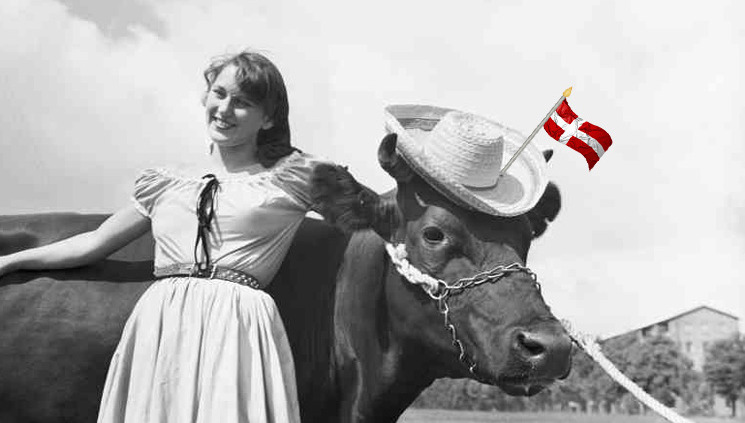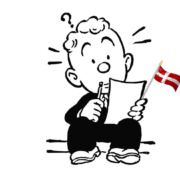Cheating on Mother Nature: Danes and Environmentalism
It’s been a beautiful autumn here in Denmark. Golden sun and blue skies, red and yellow and orange leaves on the trees. Just gorgeous. And unusually warm for Denmark. It’s always exciting when, instead of wearing your winter coat every day from October to April, you can wear it every day from November to April.
But this unusually pleasant weather can’t help but spark conversation about global warming. So far, the biggest impact climate change has had on Denmark are some severe rainstorms, which end up flooding a lot of basements and overwhelming a lot of sewer systems. It’s intriguing to think that plumbers may become the great heroes of the twenty-first century.
Danes care about climate change, and they’ve made a business specialty of green technology, or what they like to call clean technology. Cleantech. Denmark sells windmills to create wind power, and burns most of its household garbage in an environmentally friendly way to create home heating.
Danes care about the environment because they care about nature. Less than a hundred years ago, Denmark was a mostly agricultural country, and Danes still feel close to the land. Children in Denmark are constantly being taken out into whatever forests or meadows are nearby – in the cities, they get packed onto buses and trains to go get the forest experience. There’s even something called forest kindergarten (skovbørnehave) for children age 3 to 6. If you go to a forest kindergarten, you’re out in the woods every day, rain or shine, hot or cold.
The world’s fourth biggest polluter, per capita
So, it’s ironic, given this romance between Danes and environmentalism, that Denmark was recently named the world’s fourth biggest polluter per capita by the World Wildlife Fund. Only three Middle Eastern countries. – Kuwait, Qatar, and the UAE, were worse. (The US was 8th.)
The reason the Danes come in so high on this list is meat, specifically pigs. Pigs and pig products are Denmark’s major exports. Live pigs, pork, and diabetic insulin, which is genetically modified based on an extract from the pancreas of pigs. Denmark has more pigs than people; it’s the pigs that pay for all Denmark’s chic corporate sustainability departments and all those wind turbines.
The modern Danish clean-energy economy is built on the back of pigs, and pigs are environmentally dirty. So are Denmark’s thriving dairy industry and wearable fur industry.
What’s more, the World Wildlife Fund tracks not only local pollution, but the pollution local consumers produce elsewhere. So, if a Dane buys a T-shirt from H&M or an iPhone that is produced in China, the pollution goes on the Danish account. And Danes buy a lot of stuff from abroad.
Danes also love to eat meat, from both local and international sources. And they love to travel. Airplanes leave a terrible carbon footprint.
Now, all these contradictions don’t mean the Danes don’t believe in environmentalism. They do. But it’s common to many religions that the loudest professed believers often do the exact opposite in their personal lives.
Still, no one likes to talk about their own hypocrisy. So, at your next dinner Danish party, as you enjoy a tasty pork roast and discuss your host’s fabulous recent trip to Thailand and compliment her new leather jacket, remember to work into the conversation how much you care about the environment. It’s the right thing to do.
[icon name=”facebook-square” class=”fa-3x”] [icon name=”twitter-square” class=”fa-3x”][icon name=”instagram” class=”fa-3x”]
Buy Kay’s books about Denmark on Amazon, Saxo, Google Books, Apple Books, Barnes & Noble Nook, or via our webshop.
Image mashup copyright Kay Xander Mellish [current_year]
Read more:
The Deeper Meaning of Pigs
Animals and Denmark – which animal represents Denmark best?








Kay, I suggest you two subjects to talk about: how is hitchhiking seen in Denmark comparing to the USA (where I heard that it’s not always so good) and also Dumpster Diving in DK, if you know something about it. Because I know that at least Dumpster Diving there’s plenty of people doing, and I even heard a case that a guy who works in one of the biggest supermarket chains in the country peed in the dumpster bin and left a paper note telling that to the ones coming to “dive” during the night.
Because your post today was about environment, I’ve remembered this and thought – why not suggest. 😉
Wait- The pigs which are mostly export products are counted, but the stuff we import from abroad is also placed on our balance? How can this be science?
I like your stories but I wish they’d have more bite, if you know what I mean.
The most shocking thing for me in DK is massive consumption. I have tried but I cannot wrap my head around this mentality of buying c**p, wasting food and then preachin sustainability in universities…